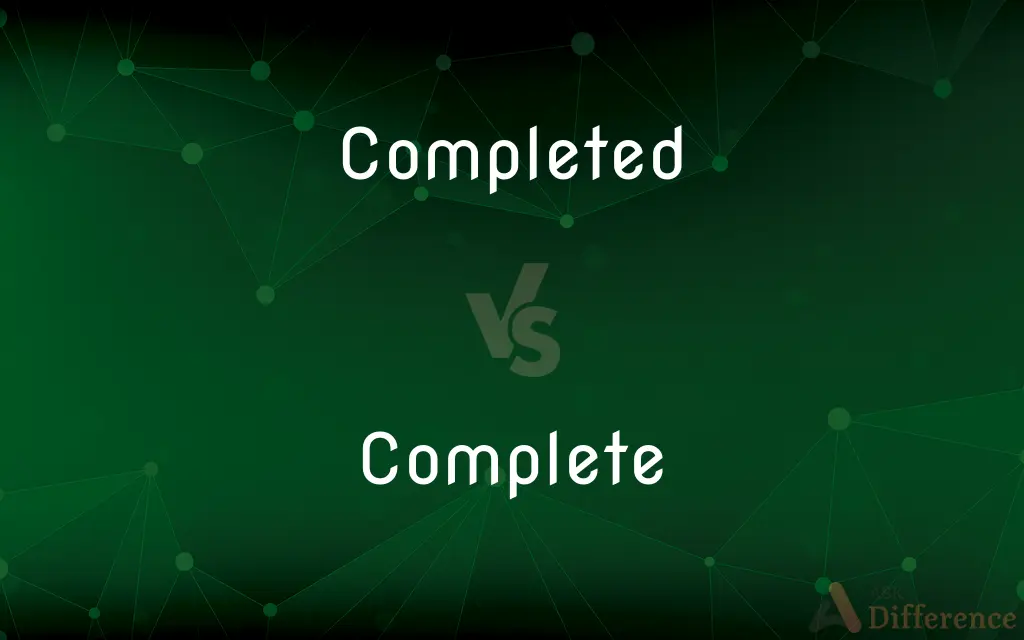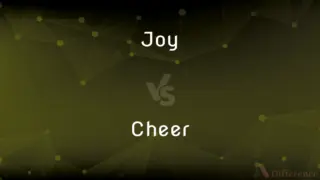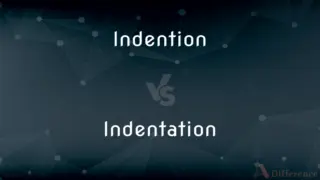Completed vs. Complete — What's the Difference?
Edited by Tayyaba Rehman — By Fiza Rafique — Updated on March 22, 2024
"Completed" implies that an action has been finished recently or at a specified time in the past, while "complete" describes a state of being whole or fully finished, without specifying when.

Difference Between Completed and Complete
Table of Contents
ADVERTISEMENT
Key Differences
"Completed" is the past participle of "complete," often used to describe something that has been fully finished or accomplished, typically in the recent past. It implies action and is frequently used in contexts where the focus is on the process of finishing something. On the other hand, "complete" is an adjective that describes something as being whole, entire, or having all necessary parts, without necessarily indicating when it became so. It emphasizes the state rather than the process or timing, as in "The collection is complete," which suggests that the collection lacks nothing but does not specify when it was finished.
While "completed" is often associated with tasks, projects, or actions that have reached their end, "complete" can refer to a broader range of subjects, including objects, collections, or conditions that are fully constituted. For example, "completed assignments" refer specifically to tasks that students have finished, whereas "a complete set" could refer to anything from a collection of books to a toolkit that contains all the necessary items.
In some contexts, "complete" can also imply thoroughness or the extent to which something is done. For example, "a complete renovation" suggests a renovation that encompasses all parts of a structure, not just a part of it. Conversely, "completed" focuses more on the finality of an action or process, such as "The renovation was completed in June," which indicates the action of finishing the renovation without commenting on its thoroughness or scope.
The choice between "completed" and "complete" can also affect the tone and focus of a statement. Using "completed" might draw attention to the effort, process, or timeline involved in finishing something, while "complete" might highlight the current state or quality of being whole or entire, often without a direct reference to the effort or time it took to reach that state.
Despite their differences, both terms convey the idea of something being fully made, done, or accomplished. The distinction lies in the focus on the process and recency with "completed" and the emphasis on the state or condition with "complete."
ADVERTISEMENT
Comparison Chart
Part of Speech
Past participle (verb)
Adjective
Emphasis
On the action of finishing
On the state of being whole
Time Reference
Often implies recent or specific past completion
Timeless; does not specify when completion occurred
Usage Context
Actions, tasks, processes
Objects, conditions, states
Connotation
Finality of action
Wholeness, thoroughness
Compare with Definitions
Completed
Finished or concluded action.
The building was completed in 2020.
Complete
Entire or whole.
She finally had a complete set of the classic novels.
Completed
Reached the end of a process.
The training program was successfully completed by all participants.
Complete
Finished with all parts included.
The puzzle is complete when every piece fits.
Completed
Fully accomplished task.
The artist completed his masterpiece after years of work.
Complete
Thorough or exhaustive.
The documentary offers a complete history of the empire.
Completed
Final stage of development.
The software update was completed overnight.
Complete
Fully inclusive.
The report provides a complete overview of the findings.
Completed
Achieved desired outcome.
The team completed the project under budget.
Complete
Perfect or unblemished.
They shared a moment of complete happiness.
Completed
Having all necessary or normal parts, components, or steps; entire
A complete medical history.
A complete set of dishes.
Complete
Having all necessary or normal parts, components, or steps; entire
A complete medical history.
A complete set of dishes.
Completed
(Botany) Having all principal parts, namely, the sepals, petals, stamens, and pistil or pistils. Used of a flower.
Complete
(Botany) Having all principal parts, namely, the sepals, petals, stamens, and pistil or pistils. Used of a flower.
Completed
Having come to an end; concluded
The renovation of the kitchen is complete.
Complete
Having come to an end; concluded
The renovation of the kitchen is complete.
Completed
Absolute; thorough
Complete control.
A complete mystery.
Complete
Absolute; thorough
Complete control.
A complete mystery.
Completed
Accomplished; consummate
A complete musician.
Complete
Accomplished; consummate
A complete musician.
Completed
(Football) Caught in bounds by a receiver
A complete pass.
Complete
(Football) Caught in bounds by a receiver
A complete pass.
Completed
To bring to a finish or an end
She has completed her studies.
Complete
To bring to a finish or an end
She has completed her studies.
Completed
To make whole, with all necessary elements or parts
A second child would complete their family. Fill in the blanks to complete the form.
Complete
To make whole, with all necessary elements or parts
A second child would complete their family. Fill in the blanks to complete the form.
Completed
(Football) To throw (a forward pass) that is caught in bounds by a receiver.
Complete
(Football) To throw (a forward pass) that is caught in bounds by a receiver.
Completed
Simple past tense and past participle of complete
Complete
(ambitransitive) To finish; to make done; to reach the end.
He completed the assignment on time.
Completed
Finished.
Complete
(transitive) To make whole or entire.
The last chapter completes the book nicely.
Completed
Brought to a conclusion.
Complete
(poker) To call from the small blind in an unraised pot.
Completed
Successfully accomplished or achieved.
Complete
With all parts included; with nothing missing; full.
My life will be complete once I buy this new television.
She offered me complete control of the project.
After she found the rook, the chess set was complete.
Completed
Caught in bounds by a player on the same side as the passer; - said of a forward pass; as, Simms had six completed passes out of seven tries in the game..
Complete
Finished; ended; concluded; completed.
When your homework is complete, you can go and play with Martin.
Completed
Successfully completed or brought to an end;
His mission accomplished he took a vacation
The completed project
The joy of a realized ambition overcame him
Complete
Generic intensifier.
He is a complete bastard!
It was a complete shock when he turned up on my doorstep.
Our vacation was a complete disaster.
Completed
Caught;
A completed forward pass
Complete
In which every Cauchy sequence converges to a point within the space.
Complete
In which every set with a lower bound has a greatest lower bound.
Complete
In which all small limits exist.
Complete
In which every semantically valid well-formed formula is provable.
Complete
That is in a given complexity class and is such that every other problem in the class can be reduced to it (usually in polynomial time or logarithmic space).
Complete
Filled up; with no part or element lacking; free from deficiency; entire; perfect; consummate.
Ye are complete in him.
That thou, dead corse, again in complete steelRevisit'st thus the glimpses of the moon.
Complete
Finished; ended; concluded; completed; as, the edifice is complete.
This course of vanity almost complete.
Complete
Having all the parts or organs which belong to it or to the typical form; having calyx, corolla, stamens, and pistil.
Complete
To bring to a state in which there is no deficiency; to perfect; to consummate; to accomplish; to fulfill; to finish; as, to complete a task, or a poem; to complete a course of education.
Bred only and completed to the tasteOf lustful appetence.
And, to complete her bliss, a fool for mate.
Complete
Come or bring to a finish or an end;
He finished the dishes
She completed the requirements for her Master's Degree
The fastest runner finished the race in just over 2 hours; others finished in over 4 hours
Complete
Bring to a whole, with all the necessary parts or elements;
A child would complete the family
Complete
Complete or carry out;
Discharge one's duties
Complete
Complete a pass
Complete
Write all the required information onto a form;
Fill out this questionnaire, please!
Make out a form
Complete
Having every necessary or normal part or component or step;
A complete meal
A complete wardrobe
A complete set pf the Britannica
A complete set of china
A complete defeat
A complete accounting
An incomplete flower
Complete
Perfect and complete in every respect; having all necessary qualities;
A complete gentleman
Consummate happiness
A consummate performance
Complete
Having all four whorls or principal parts--sepals and petals and stamens and carpels (or pistils);
Complete flowers
Complete
Highly skilled;
An accomplished pianist
A complete musician
Complete
Without qualification; used informally as (often pejorative) intensifiers;
An arrant fool
A complete coward
A consummate fool
A double-dyed villain
Gross negligence
A perfect idiot
Pure folly
What a sodding mess
Stark staring mad
A thoroughgoing villain
Utter nonsense
Complete
Having come or been brought to a conclusion;
The harvesting was complete
The affair is over, ended, finished
The abruptly terminated interview
Common Curiosities
What does it mean when a project is completed?
It means the project has been fully finished or accomplished, often implying that this occurred recently or within a specified timeframe.
Can "completed" refer to a state of being?
While "completed" can refer to the state of having finished something, it inherently carries the connotation of an action having been taken to reach that state.
Can a person be described as complete?
Yes, in a figurative sense, describing a person as "complete" might suggest they are well-rounded or lack nothing in character or development.
What does a complete collection imply?
A complete collection implies that it contains every item intended to be in it, lacking nothing.
Is it correct to say a book is completed?
Yes, it's correct if referring to the action of finishing reading or writing the book. Saying the book is "complete" would refer to it having all its parts, such as pages and chapters.
How does the usage of "complete" differ in "complete stranger"?
In "complete stranger," "complete" emphasizes totality, suggesting no familiarity whatsoever.
Does "completed" always imply success?
Not necessarily. While "completed" indicates that something has been finished, it doesn't inherently convey the quality or success of the outcome.
What is a "complete failure"?
A "complete failure" is an expression used to describe a situation or attempt that has utterly failed to meet its goals or expectations.
Can a meal be described as "complete"?
Yes, a meal can be described as "complete" if it includes all the necessary components, such as various courses or nutritional elements.
Is "completed" only used for tasks and projects?
Primarily, yes, "completed" is often used to describe tasks, projects, or processes that have been finished.
Share Your Discovery

Previous Comparison
Joy vs. Cheer
Next Comparison
Indention vs. IndentationAuthor Spotlight
Written by
Fiza RafiqueFiza Rafique is a skilled content writer at AskDifference.com, where she meticulously refines and enhances written pieces. Drawing from her vast editorial expertise, Fiza ensures clarity, accuracy, and precision in every article. Passionate about language, she continually seeks to elevate the quality of content for readers worldwide.
Edited by
Tayyaba RehmanTayyaba Rehman is a distinguished writer, currently serving as a primary contributor to askdifference.com. As a researcher in semantics and etymology, Tayyaba's passion for the complexity of languages and their distinctions has found a perfect home on the platform. Tayyaba delves into the intricacies of language, distinguishing between commonly confused words and phrases, thereby providing clarity for readers worldwide.














































